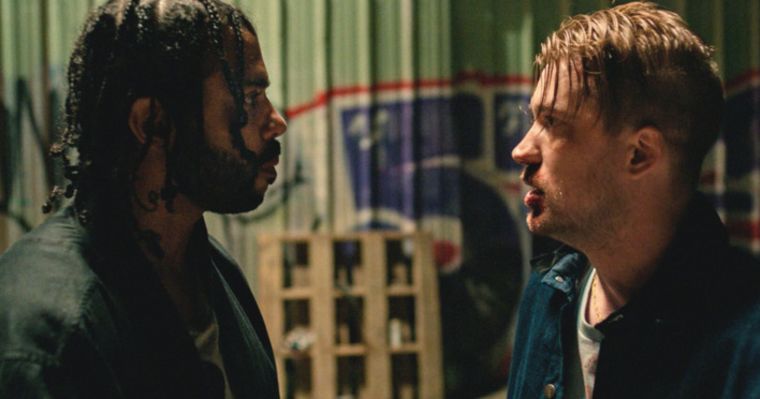3 min to read
Blindspotting
A thematically impressive feat for a pair of rappers turned screenwriters, Blindspotting is a nuanced and heartfelt loveletter to the Oakland of old.
by Zach Saul

Daveed Diggs said in an interview that he and co-writer/co-star Rafael Casal have been writing Blindspotting over the course of a decade, and that diligence and intimacy really showed. Both actors have a background in rap, poetry and spoken word and they flexed that muscle and then some in Blindspotting. The most emotionally charged scenes in the movie (for example when Diggs confronts the cop he witnessed shoot a scared black man) all feature raps that serve to break the fourth wall, and provide a stylistic flare. When Diggs and Casal are shown rapping it’s almost as though lyricism enables them to say what polite society won’t, and in doing so they’re rebelling what Oakland has become.
The trailer for Blindspotting shows Colin (Daveed Diggs) witnessing a police shooting and will lead most people who haven’t seen the film to believe the movie is about racial tensions, justice and revenge. Those themes are certainly present, but Blindspotting’s dirty little secret? It’s actually about gentrification. That much is clear from the striking opening credit sequence. We’re shown a gritty 90’s Oakland with graffiti artists, skaters, and Raiders fans juxtaposed with the current Oakland where hipsters and tech entrepreneurs move in and replacing regular ketchup with umami ketchup. Gentrification, and the frustrations surrounding when the “haves” move into the “have-nots” backyard is something people inside and outside of Oakland can relate to. These frustrations are covered with skill and sensitivity in this movie, which dares to suggest racial tensions are more complicated than bigots fighting Black Lives Matter protesters.
There is a lot of thematic brilliance in Blindspotting that’s really unique, and it all stems from juxtaposition. The way Colin and Miles regard the new “hipsters” who live in their neighborhood is juxtaposed against the benevolent prejudice the white establishment for African-Americans. The way Val (Colin’s girlfriend) regards Colin is juxtaposed against the way we think about wrongdoing, and in a particularly poignant exchange at Colin’s halfway house his manager tells him: “you are now a convicted felon until proven otherwise. Prove otherwise at all times”.
On the surface, some of the characters in Blindspotting have cartoonish moments in the name of comedic relief, but are all complicated and reprehensible enough that the audience is given real space to disagree with them if they chose. Miles and Colin have both made decisions there is absolutely no excuse for, but they’ve also been wronged in ways serious enough to explain their anger. The way Miles and Colin’s relationship evolves over the course of the movie is beautifully written, and dares to explore emotions beyond anger and humor (the most acceptable and clichéd male emotions according to Casal).
The Good: Blindspotting is more nuanced then it will likely get credit for, and its focus on gentrification made it feel fresh, honest, and resonant. This movie is a sad, funny, and heart wrenching love letter to Oakland, and the TLC Diggs and Casal put into the script and their performances is palpable. The way the weighty thematic topics of race, class, revenge, bias, and privilege collide throughout the narrative was very thought provoking and sparked some cool conversations after the movie.
The Bad: Not 100% of the jokes land. I admire what Diggs and Casal were attempting with their rap sequences, but it felt unnecessary to me in some spots.
| Movie Details | |||||
|---|---|---|---|---|---|
| Studio: | |||||
| Director: | Carlos López Estrada | ||||
| Written By: | |||||
| Staring: | Daveed Diggs | Rafael Casal | |||

Comments